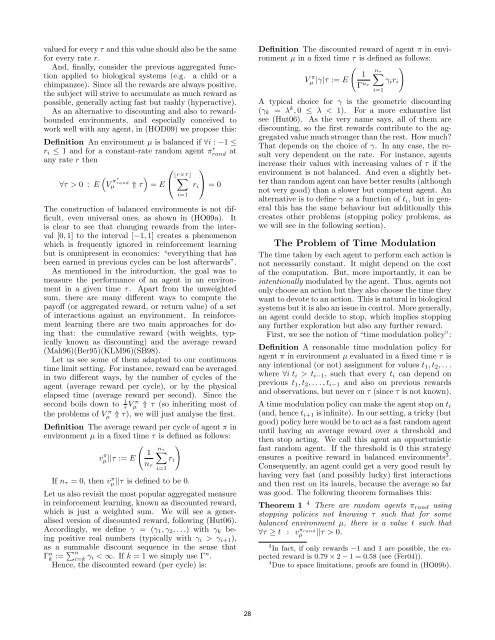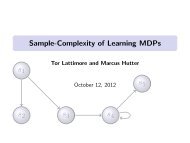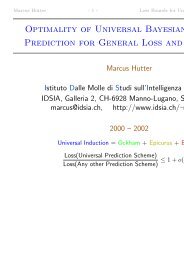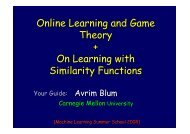Advances in Intelligent Systems Research - of Marcus Hutter
Advances in Intelligent Systems Research - of Marcus Hutter
Advances in Intelligent Systems Research - of Marcus Hutter
You also want an ePaper? Increase the reach of your titles
YUMPU automatically turns print PDFs into web optimized ePapers that Google loves.
valued for every τ and this value should also be the same<br />
for every rate r.<br />
And, f<strong>in</strong>ally, consider the previous aggregated function<br />
applied to biological systems (e.g. a child or a<br />
chimpanzee). S<strong>in</strong>ce all the rewards are always positive,<br />
the subject will strive to accumulate as much reward as<br />
possible, generally act<strong>in</strong>g fast but rashly (hyperactive).<br />
As an alternative to discount<strong>in</strong>g and also to rewardbounded<br />
environments, and especially conceived to<br />
work well with any agent, <strong>in</strong> (HOD09) we propose this:<br />
Def<strong>in</strong>ition An environment µ is balanced if ∀i : −1 ≤<br />
r i ≤ 1 and for a constant-rate random agent πrand r at<br />
any rate r then<br />
( )<br />
∀τ > 0 : E V πr rand<br />
µ ⇑ τ<br />
⎛<br />
∑<br />
= E ⎝<br />
⌊r×τ⌋<br />
i=1<br />
r i<br />
⎞<br />
⎠ = 0<br />
The construction <strong>of</strong> balanced environments is not difficult,<br />
even universal ones, as shown <strong>in</strong> (HO09a). It<br />
is clear to see that chang<strong>in</strong>g rewards from the <strong>in</strong>terval<br />
[0, 1] to the <strong>in</strong>terval [−1, 1] creates a phenomenon<br />
which is frequently ignored <strong>in</strong> re<strong>in</strong>forcement learn<strong>in</strong>g<br />
but is omnipresent <strong>in</strong> economics: “everyth<strong>in</strong>g that has<br />
been earned <strong>in</strong> previous cycles can be lost afterwards”.<br />
As mentioned <strong>in</strong> the <strong>in</strong>troduction, the goal was to<br />
measure the performance <strong>of</strong> an agent <strong>in</strong> an environment<br />
<strong>in</strong> a given time τ. Apart from the unweighted<br />
sum, there are many different ways to compute the<br />
pay<strong>of</strong>f (or aggregated reward, or return value) <strong>of</strong> a set<br />
<strong>of</strong> <strong>in</strong>teractions aga<strong>in</strong>st an environment. In re<strong>in</strong>forcement<br />
learn<strong>in</strong>g there are two ma<strong>in</strong> approaches for do<strong>in</strong>g<br />
that: the cumulative reward (with weights, typically<br />
known as discount<strong>in</strong>g) and the average reward<br />
(Mah96)(Ber95)(KLM96)(SB98).<br />
Let us see some <strong>of</strong> them adapted to our cont<strong>in</strong>uous<br />
time limit sett<strong>in</strong>g. For <strong>in</strong>stance, reward can be averaged<br />
<strong>in</strong> two different ways, by the number <strong>of</strong> cycles <strong>of</strong> the<br />
agent (average reward per cycle), or by the physical<br />
elapsed time (average reward per second). S<strong>in</strong>ce the<br />
second boils down to 1 τ V µ<br />
π ⇑ τ (so <strong>in</strong>herit<strong>in</strong>g most <strong>of</strong><br />
the problems <strong>of</strong> Vµ<br />
π ⇑ τ), we will just analyse the first.<br />
Def<strong>in</strong>ition The average reward per cycle <strong>of</strong> agent π <strong>in</strong><br />
environment µ <strong>in</strong> a fixed time τ is def<strong>in</strong>ed as follows:<br />
( )<br />
vµ||τ π 1 ∑n τ<br />
:= E r i<br />
n τ<br />
i=1<br />
If n τ = 0, then v π µ||τ is def<strong>in</strong>ed to be 0.<br />
Let us also revisit the most popular aggregated measure<br />
<strong>in</strong> re<strong>in</strong>forcement learn<strong>in</strong>g, known as discounted reward,<br />
which is just a weighted sum. We will see a generalised<br />
version <strong>of</strong> discounted reward, follow<strong>in</strong>g (Hut06).<br />
Accord<strong>in</strong>gly, we def<strong>in</strong>e γ = (γ 1 , γ 2 , . . .) with γ k be<strong>in</strong>g<br />
positive real numbers (typically with γ i > γ i+1 ),<br />
as a summable discount sequence <strong>in</strong> the sense that<br />
Γ n k := ∑ n<br />
i=k γ i < ∞. If k = 1 we simply use Γ n .<br />
Hence, the discounted reward (per cycle) is:<br />
Def<strong>in</strong>ition The discounted reward <strong>of</strong> agent π <strong>in</strong> environment<br />
µ <strong>in</strong> a fixed time τ is def<strong>in</strong>ed as follows:<br />
(<br />
)<br />
Vµ π 1 ∑n τ<br />
|γ|τ := E γ i r i<br />
Γ nτ<br />
i=1<br />
A typical choice for γ is the geometric discount<strong>in</strong>g<br />
(γ k = λ k , 0 ≤ λ < 1). For a more exhaustive list<br />
see (Hut06). As the very name says, all <strong>of</strong> them are<br />
discount<strong>in</strong>g, so the first rewards contribute to the aggregated<br />
value much stronger than the rest. How much?<br />
That depends on the choice <strong>of</strong> γ. In any case, the result<br />
very dependent on the rate. For <strong>in</strong>stance, agents<br />
<strong>in</strong>crease their values with <strong>in</strong>creas<strong>in</strong>g values <strong>of</strong> τ if the<br />
environment is not balanced. And even a slightly better<br />
than random agent can have better results (although<br />
not very good) than a slower but competent agent. An<br />
alternative is to def<strong>in</strong>e γ as a function <strong>of</strong> t i , but <strong>in</strong> general<br />
this has the same behaviour but additionally this<br />
creates other problems (stopp<strong>in</strong>g policy problems, as<br />
we will see <strong>in</strong> the follow<strong>in</strong>g section).<br />
The Problem <strong>of</strong> Time Modulation<br />
The time taken by each agent to perform each action is<br />
not necessarily constant. It might depend on the cost<br />
<strong>of</strong> the computation. But, more importantly, it can be<br />
<strong>in</strong>tentionally modulated by the agent. Thus, agents not<br />
only choose an action but they also choose the time they<br />
want to devote to an action. This is natural <strong>in</strong> biological<br />
systems but it is also an issue <strong>in</strong> control. More generally,<br />
an agent could decide to stop, which implies stopp<strong>in</strong>g<br />
any further exploration but also any further reward.<br />
First, we see the notion <strong>of</strong> “time modulation policy”:<br />
Def<strong>in</strong>ition A reasonable time modulation policy for<br />
agent π <strong>in</strong> environment µ evaluated <strong>in</strong> a fixed time τ is<br />
any <strong>in</strong>tentional (or not) assignment for values t 1 , t 2 , . . .<br />
where ∀i t i > t i−1 , such that every t i can depend on<br />
previous t 1 , t 2 , . . . , t i−1 and also on previous rewards<br />
and observations, but never on τ (s<strong>in</strong>ce τ is not known).<br />
A time modulation policy can make the agent stop on t i<br />
(and, hence t i+1 is <strong>in</strong>f<strong>in</strong>ite). In our sett<strong>in</strong>g, a tricky (but<br />
good) policy here would be to act as a fast random agent<br />
until hav<strong>in</strong>g an average reward over a threshold and<br />
then stop act<strong>in</strong>g. We call this agent an opportunistic<br />
fast random agent. If the threshold is 0 this strategy<br />
ensures a positive reward <strong>in</strong> balanced environments 3 .<br />
Consequently, an agent could get a very good result by<br />
hav<strong>in</strong>g very fast (and possibly lucky) first <strong>in</strong>teractions<br />
and then rest on its laurels, because the average so far<br />
was good. The follow<strong>in</strong>g theorem formalises this:<br />
Theorem 1 4 There are random agents π rand us<strong>in</strong>g<br />
stopp<strong>in</strong>g policies not know<strong>in</strong>g τ such that for some<br />
balanced environment µ, there is a value t such that<br />
∀τ ≥ t : v π rand<br />
µ ||τ > 0.<br />
3 In fact, if only rewards −1 and 1 are possible, the expected<br />
reward is 0.79 × 2 − 1 = 0.58 (see (Fer04)).<br />
4 Due to space limitations, pro<strong>of</strong>s are found <strong>in</strong> (HO09b).<br />
28













